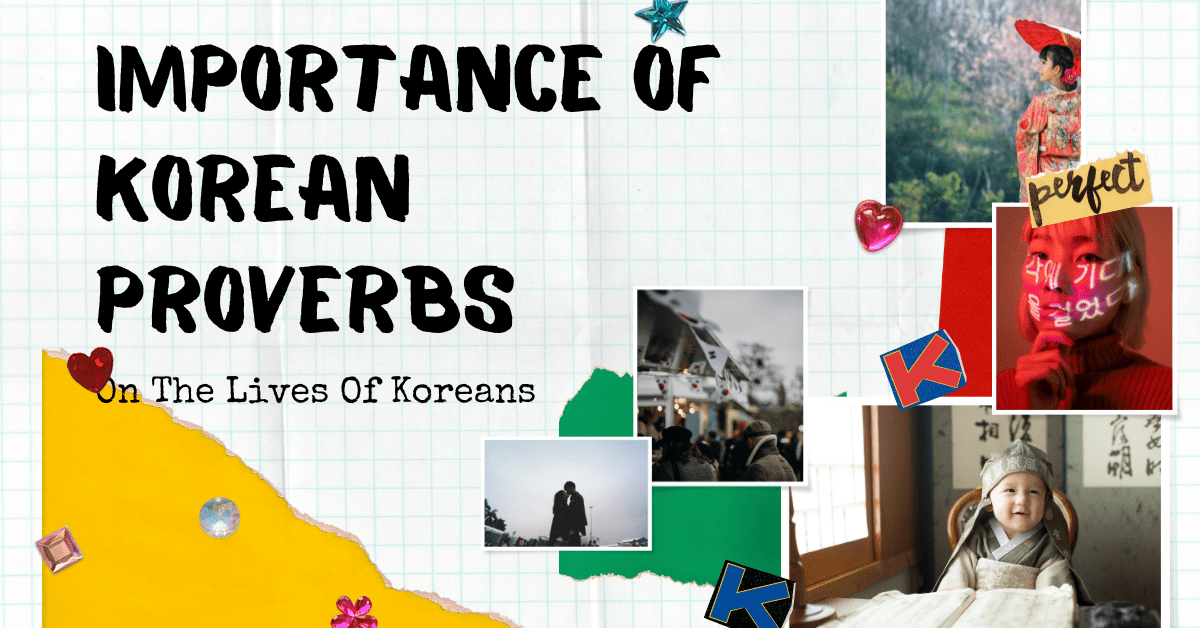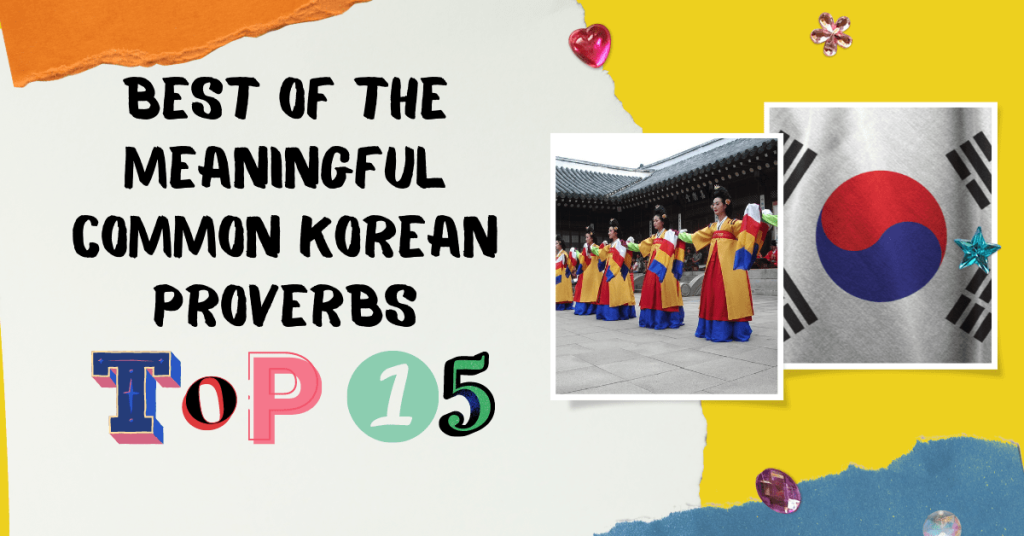Learning different proverbs from various countries teaches good fortune to a lot of people. In Korean culture, common Korean Proverbs are part of their everyday life. Today’s blog will talk about useful Korean Proverbs to learn to sound like a local.
In a word, the Korean proverb describes wisdom. Through their ancestors, they passed various Korean idioms, sayings, and proverbs that talk about how to become wise in everyday life.
In Korean class, a Korean student is taught to appreciate more of their Korean culture and history than any other else. For example, they respect elders (seniority), they are hardworking (busy learning skills), and respect other religions and beliefs, and other history-related festivals and rituals. Those values and wisdom that came from their ancestors reflect the lives of Koreans up until now.
Knowing those backgrounds allows Koreans to recognize the importance of their history to learn Korean or Hangul more seriously. For them, learning Korean is understanding and preserving their Korean culture. An example of this is learning a Korean proverb.
Want to know about the common Korean Proverbs and their meanings? Check this out!
Common Korean Proverbs And Their Meanings
공자 앞에서 문자 쓴다 (gongja apeseo munja sseunda)
The meaning of this Korean Proverb is ‘Don’t try to teach a fish how to swim.’ You can use this proverb to a person who is arrogant and tries to be more expert than a more intellectual person.
다 된 밥에 재 뿌리지 마라 (da doen babe jae ppuriji mara)
This proverb means ‘Don’t rain on someone’s parade.’ The literal translation of this Korean proverb is ‘Don’t spread ashes on cooked rice.’ You can use this proverb to advise someone not to ruin a fun or lovely scenario. For instance, you are delivering bad news at a family reunion.
장님이 코끼리 만지는 격이다 (jangnimi kokkiri manjineun gyeogida)
This common Korean proverb means ‘It is like a blind man describing an elephant.’ The literal translation is, ‘It is like a blind man touching an elephant.’ The usage of this proverb is if you want to describe someone who is acting like a genius, but you know that he lacks in intellectual aspects. This proverb is the same with 공자 앞에서 문자 쓴다 (gongja apeseo munja sseunda).
고생 끝에 낙이 온다 (gosaeng kkeute nagionda)
The literal translation of this is, ‘At the end of hardship comes happiness.’ This Korean proverb is often used to encourage someone to overcome worry and never give up on difficult times.
개천에서 용 난다 (gaecheoneseo yong nanda)
The literal meaning of this Korean proverb is ‘A dragon rises up from a small stream.’ This Korean proverb came from ancient myths and stories about dragons rising from the depths of the sea; therefore, it would be both unexpected and astonishing if one were to rise from a shallow stream. In short, this Korean proverb is used to describe an individual arising from humble beginnings.
누워서 떡 먹기 (nuwoseo tteog meoggi)
The literal translation is ‘eating rice cakes while lying down.’ This Korean Proverb is similar to the English expression ‘a piece of cake’. So I know you are familiar with this English expression that means ‘very easy.’
낮말은 새가 듣고 밤말은 쥐가 듣는다 (deudgo bammal-eun jwiga deudneunda)
The literal meaning of this Korean proverb is ‘Birds hear the words spoken in the day, and the mice those at night.’ This is commonly used to warn someone to be careful what he or she says. Because he or she will never know who may be listening. The Western equivalent of this proverb is ‘walls have ears.’
김치국부터 마시지 말라 (Kimchigugbuteo masiji malla)
The Korean language’s literal translation is ‘Don’t drink the kimchi soup first.’ We all know that in South Korea, kimchi soup is usually eaten after the main course to aid digestion, so the person should finish the main meal before eating it. This proverb means that you should not expect too early but wait until what you expect happens before taking it into action. Its brave literal translation in English idiomatic expressions is ‘Don’t count your chickens before they hatch!’
가재는 게 편이라 (gajaeneun ge pyeonila)
The Korean literal meaning of this is ‘The crayfish sides with the crab.’ I want to share a trivia, do you know that crayfish and crab have many similar traits? This means that they would side with each other. This is a company literal translation that means individuals with similar traits or characteristics usually stick together.
과부 설움은 홀아비가 안다 (gwabu seolumeun holabiga anda)
The Korean literal meaning of this proverb is ‘a widower knows a widow’s sorrow.’ This is commonly used to express the unhappiness of an individual who likes to express his/her feelings and emotions to others and is comforted by the unhappiness of others. In English idiomatic expressions, it is ‘misery loves company.’
원숭이도 나무에서 떨어진다 (Wonsungido namueseo tteoleojinda)
The literal meaning of this is ‘even monkeys fall from trees.’ This is one of the traditional Korean proverbs. In addition, this Korean expression implies that even if a person says that he/she is an expert in something, they sometimes make mistakes. Monkeys are great climbers, but they sometimes fall. So this Korean proverb can be used to explain motivations that sometimes mistakes happen.
그림의 떡 (crimue ddeok)
The literal meaning of this Korean proverb is ‘a picture of a rice cake.’ We all know that most South Koreans love to eat rice cakes. For instance, when a person wants to have something, he or she tends to imagine a picture of it. Since it is all about imagination, they only see a picture of it in their eyes. For that reason, that person may feel that he or she needs to have it, but since it is an imagination, they can’t get it, so they try to forget about it.
제 눈에 안경이다 (je nune angyeongida)
This Korean proverb’s literal meaning is ‘glasses in my eyes.’ It is also like the most common English proverb ‘beauty is in the eye of the beholder. You can use this common proverb when you have a different perspective than others. For instance, your friend is attracted to a person who wears formal attire, but you are not. Furthermore, we appreciate and see a different perspective on life.
보기 좋은 떡이 먹기도 좋다 (bogi joeun tteogi meokgido jota)
The Korean literal translation of this proverb means ‘good looking tteok (rice cake) tastes good.’ This also means ‘what looks good tastes good’ in English. For instance, there comes a time when you see something good, and you also think that it also has a good quality because someone put an effort to make it look good. You can use this Korean proverb when you see something delicious because it is prepared with creativity, just like some Korean Cuisines.
눈에서 멀어지면, 마음에서도 멀어진다 (nuneseo meoreojimyeon, maeumeseodo meoreojinda)
The meaning of this Korean proverb is ‘out of sight, out of mind,’ but its literal translation in Korea is ‘If it becomes distant from your eyes, it also becomes distant from your mind (heart).’ Therefore, you can use this proverb when you want to forget someone or something. For instance, if you’re going to forget about your past relationship, you should never see them or think about them so you to forget them easily. Furthermore, in Korea, they usually use this proverb when a particular couple has a problem in their long-distance relationship. They use this proverb because they used to drift apart if they couldn’t often see each other.
Korean Proverbs And Sayings On The Lives Of Koreans

Korean proverbs have a great impact on the current life of Koreans. Through the different types of Korean literal translations from Western equivalent words. They use these as their words of wisdom and guidance in having their own business and in their own life or their own will.
As you can observe, the common Korean Proverbs that are presented above are adapted from English Proverbs and expressions. It’s like the Korean equivalent of Western Proverbs. In other words, the proverbs from the past are still present and are reflected today in the lives of Koreans.
All in all, the culture of a certain country is often preserved through the usage of words, phrases, and sentences that have become famous sayings, expressions, idioms, and most probably the continuous usage of proverbs. But as language learners, we should not only say those proverbs. We should act it. Remember the great saying, ‘Actions speak louder than words.’
Want to know more about the Korean language, like Korean slang, to sound like a local? Download Ling App for more discoveries.
Learning Korean Language And Other Languages With Ling App

Interested to learn more about Korea? Download Ling App by Simya Solutions.
Ling App can help and guide you to achieve your target language, as the Korean language.
Also, Ling App is a user-friendly application that offers various languages from 60+ different countries around the world. Through this app, you can have a hassle-free way of learning a language because it has interactive games that help you practice and master your target language.
Aside from interactive mini-games, they provide updated learning guides like articles and creative blogs to explore the language you want to discover.
Can’t wait to learn more? Download Ling App now!



































































